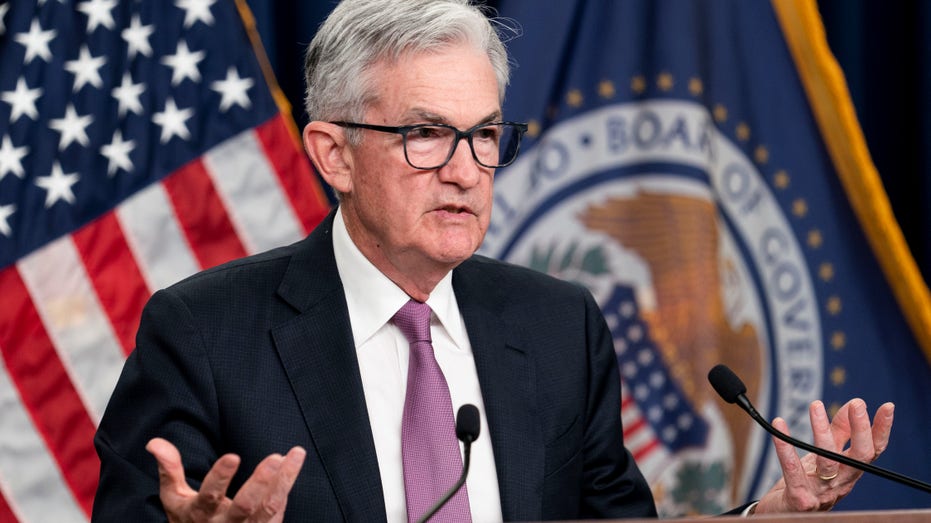Fed officials anticipate slower interest rate hikes coming 'soon,' minutes show
'Various' Fed officials show support for higher peak rate
Expect longer, but smaller rate hikes from the Fed: Quincy Krosby
LPL Financial chief global strategist Quincy Krosby reacts to the market's best day in two years after a cooler-than-expected October inflation report.
Federal Reserve officials agreed at their November meeting that smaller interest rate hikes are appropriate in coming months as they weigh the impact that tighter monetary policy is having on the broader U.S. economy.
Minutes from the U.S. central bank's Nov. 1-2 meeting released Wednesday show that policymakers anticipate downshifting the pace of rate increases soon, even though they see little signs of inflation abating. However, some committee members expressed concern about possible risks to the economy from higher rates and suggested a slower pace could allow them to assess progress on their goals. Others said they would like to wait before easing up on the pace of increases.
FED MAY NEED TO HIKE INTEREST RATES ABOVE 6% TO CRUSH INFLATION, LARRY SUMMERS SAYS
"A substantial majority of participants judged that a slowing in the pace of increase would likely soon be appropriate," the minutes said. "The uncertain lags and magnitudes associated with the effects of monetary policy actions on economic activity and inflation were among the reasons cited regarding why such an assessment was important."
During the November meeting, the Fed's rate setting body raised the central bank's target rate by 75 basis points for the fourth consecutive time, following increases in June, July and September. The move also marked the sixth rate hike for 2022. A basis point is one hundredth of one percent.
Traders now expect the Fed to approve a 50 basis point rate increase in December. The CME FedWatch tool shows a 75% chance of a half point increase and approximately 25% chance of a three-quarters raise.
The Federal Open Market Committee meets Dec. 13 and 14.
THE FED'S WAR ON INFLATION COULD COST 1M JOBS

U.S. Federal Reserve Chair Jerome Powell and members of the Federal Reserve will use this week's consumer and producer price indices reports to weigh raising interest rates an additional 75 percentage points when the group meets on Sept. 21. (Liu Jie/Xinhua via Getty Images / Getty Images)
Markets rallied following the release of the Fed's November minutes, with the Dow Jones Industrial Average climbing 95 points.
| Ticker | Security | Last | Change | Change % |
|---|---|---|---|---|
| I:DJI | DOW JONES AVERAGES | 49395.16 | -267.50 | -0.54% |
| I:COMP | NASDAQ COMPOSITE INDEX | 22682.729157 | -70.91 | -0.31% |
| SP500 | S&P 500 | 6861.89 | -19.42 | -0.28% |
Still, despite investor hopes for a more dovish Fed in coming months, "various" officials concluded at the meeting that "the ultimate level of the federal funds rate that would be necessary to achieve the committee’s goals was somewhat higher than they had previously expected," the minutes said.
DEMOCRATS SLAM 'DANGEROUS' FED RATE HIKES, WARNING OF WIDESPREAD JOB LOSSES
The Fed's efforts to cool the economy and wrestle inflation closer to its 2% target marks the most aggressive tightening campaign since the 1980s. But the efforts to combat inflation carry a potential risk of recession, and the U.S. central bank has drawn some criticism lately that it could be tightening too much. There is a growing fear that the Fed is working with backwards-looking data and that inflation has already started to cool as higher rates work their way through the economy.
Investor hopes for a Fed pivot is 'wishful thinking': Keith Banks
Bank of America pension and benefits plan CIO Keith Banks looks ahead to the final Federal Reserve meeting of 2022, and discusses the market impact of FTX's collapse.
The uncertainty expressed by policymakers at the meeting underscores the challenges they face in calibrating monetary policy, according to John Leer, the chief economist at Morning Consult.
"To put it bluntly, they don't know if, how and when their interest rate increases will start to affect the labor market, inflation and overall economic activity," Leer said. "This type of uncertainty increases the likelihood of continuing to raise rates until there's direct evidence of a slowdown in inflation and employment, which is likely to be too late to achieve a soft landing."
CLICK HERE TO READ MORE ON FOX BUSINESS
At the November meeting, policymakers unanimously voted to approve to raise the federal funds rate by 75 basis points to a range of 3.75% to 4%, the highest since before the 2008 financial crisis.
The rate hike put interest rates in firmly restrictive territory.






















